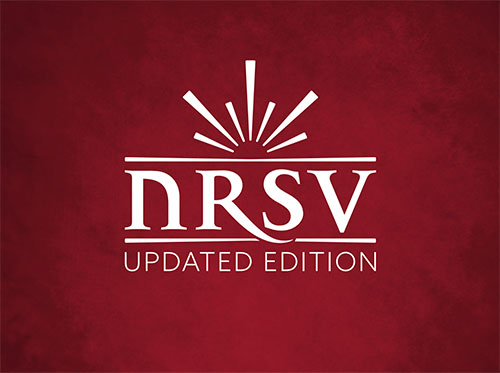
For my own reading and study, I have, for most of my life, been committed to the RSV followed by the New Revised Standard Version 1989 translation of the Bible. I have put significant time, energy, and study into the biblical languages of Hebrew and Greek. And I appreciate the approach of being “as literal as possible, as free as necessary” (NRSV’s preface To the Reader).
After four years of reviewing the NRSV, more than 20,000 revisions have been made to the NRSV. Rather than presenting this as a new revision, it is being categorised as an updated edition of the NRSV – the NRSVue. There is an insistence that this is not a new translation – it remains to be seen how different it appears to the NRSV. I am guessing there might be about 20 changes a page, and that claiming this is not a new translation may be an essentially meaningless distinction. If so, the abbreviation as NRSVue may become even more irksome – a better title might have given less of an impression of a mainly-scholars’ version.
While the NRSV has been the standard translation used in reputable English-language scholarship, it has never been generally popular. Other translations have been presented in a variety of editions attractive to general readers. The NRSV (and the NRSVue) is a translation without a theological lens, ecumenical and interfaith, suitable in Catholic, Protestant, Orthodox and Jewish contexts. That very breadth may be part of why it is regarded with suspicion by more conservative Christians.
I abhor the multiplicity of English-language bible translations – treating God’s Word as a capitalist, survival-of-the-fittest, competitive commodity. There are over a hundred complete translations of the Bible into English! Remembering passages and phrases, repeating, meditating and reflecting on them throughout the day – these are Biblical traditions that should be normative but have become uncommon in a culture where memorisation has been replaced by checking one’s smartphone.
Friendship Press has produced a sampler of the NRSVue that I encourage you to look at.
The NRSVue has Text-Critical revisions – including referencing the Dead Sea Scrolls.
There are philological revisions – English has changed. Although this is not universally appreciated, person-first language is now more common: ‘epileptics’ are now ‘having epilepsy’. There are changes to footnotes, for example, ἀδελφοὶ (adelphoi) is a Greek singular word meaning ‘siblings’ – NRSV translated this as ‘brothers and sisters’ with a footnote ‘brothers’. The footnote has been removed. ‘Leprosy’ has, more accurately, become ‘defiling skin disease’.
I would prefer, when NRSV or NRSVue make the text gender-inclusive in English by using the plural or the second person, that this is indicated in footnotes. It seems that is not the case, at least consistently. I understand that the pluralising for inclusivity when the original is judged to be gender-inclusive is at the dynamic-equivalent end of the NRSV tradition; I accept that in using a translation, it is inevitable that I compromise how I would personally deal with the text. Following what I said above, I am not about to argue for yet another English-language translation.
An e-Bible of the new version will be available on Word@Hand app – dates for this appear to have been over-optimistic. Printed bibles are intended to be available next year.



Hi Bosco, This comment “as literal as possible, as free as necessary” is simply not followed by the NRSV.
I noted a number of thoughts on NRSV in the Biblical Studies carnival published Dec 1. E.g. in Habakkuk 1 and 2:1, how do you read the gloss punishment for the root that indicates correction, or referee, or reproof (yod-kaf-chet)? And then read in the very next chapter, that they fail to use the same gloss for the same root. The traditional translations in the versions derived from the KJV use punish for a half a dozen roots and sometimes when there is no root at all to match the gloss with. But even KJV does not use punish for i-c-k (in SimHebrew) and in that translation the two glosses (correction / reproof) don’t match, but at least the imputation for the character of God is acceptable. This is only one of the many tangles of glosses that are used in the standard / authorized versions. Should we be memorizing the implication that God is one who punishes rather than corrects or reproves or visits or whatever? These translations bear false witness to the character of God.
By the way, you are mentioned in the carnival – I am always very grateful for your contributions.
Thanks, Bob. As I indicated – there are places that I would translate the text differently to the NRSV. You are adding to those places. Let us hope that NRSVue has fewer such places. In Robert Alter’s translation, “have established them for punishment” becomes “You set him aside for censure”, and “what he will answer concerning my complaint” becomes “what He will respond to my complaint.” Blessings.
I do not, nor will I ever, use the NRSV, precisely for the (mis)translation issues documented above.
Thanks, Matthew. Which translation would you use? Blessings.
Thank you for the reviews and comments on various versions of the Bible. I do not know Hebrew or Greek, so I go to the educated teachers of various branches of the Christian Tree for information. I was raised and trained as a Prostestant, and appreciate your love and reverence for God and his Word. Sincerely, in the love of Christ Jesus, KathyV.